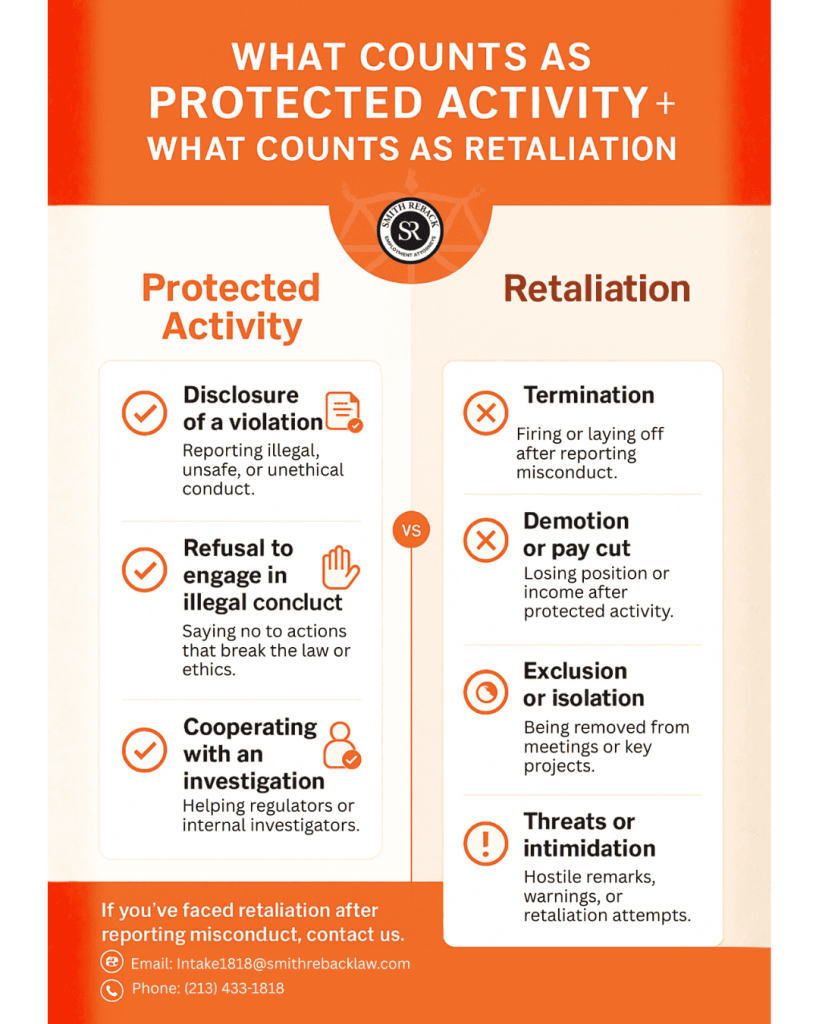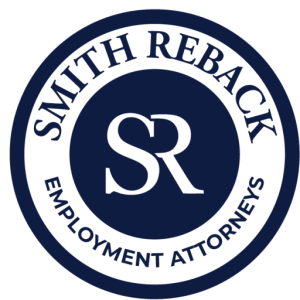Know Your Rights: What to Do If You’re Fired After Reporting Misconduct
Speaking up at work can feel like the right thing to do: you see unethical behavior, unsafe conditions, discrimination, or other misconduct, and you decide to act. But what happens when you do the right thing and then you’re terminated, demoted, or otherwise punished?
If you were fired (or otherwise retaliated against) after reporting misconduct, you may have legal protections. This article guides you through what counts as protected activity, what retaliation looks like, your rights, and how to act when you’re facing a termination that may be unlawful.
No one should lose their job for doing the right thing and the law is on your side.
Understanding Misconduct and Whistleblowing
What counts as workplace misconduct?
Workplace misconduct takes many forms. It may include:
- Harassment or discrimination (based on sex, race, age, disability, religion).
- Unsafe workplace conditions or health and safety violations.
- Wage and hour violations: unpaid overtime, missed breaks, record-keeping failures.
- Ethical or legal violations: fraud, theft, or other unlawful conduct.
- Violations of internal policies when those policies reflect legal obligations.
When you report such behavior, internally to HR or your supervisor, or externally to a regulator — you may become what the law calls a whistleblower or someone engaging in protected activity.
What qualifies as whistleblowing or protected reporting?
“Protected activity” means you took action because of your reasonable belief that something unlawful or improper was happening. Under federal law (for example by the U.S. Equal Employment Opportunity Commission (EEOC)), this includes filing a charge of discrimination, opposing discriminatory practices, cooperating in an investigation, or testifying about misconduct. EEOC+1
For whistleblower protections tied to safety, wage issues, or other labor matters, the United States Department of Labor (DOL) maintains there are protections for employees who report violations such as minimum wage/ overtime issues, record-keeping violations, youth employment laws, or health and safety violations. DOL
In general:
- If you disclosed a legal violation or wrongdoing.
- If you refused to participate in an illegal activity.
- If you cooperated with or assisted in an investigation.
You may have engaged in protected activity.
Why this matters
If you engaged in protected activity and then your employer took adverse action against you (like firing, demotion, pay cut, exclusion), you may have a claim for retaliation. As the EEOC puts it: “The laws prohibit punishing… for filing or being a witness in an EEO charge, investigation, or lawsuit.” EEOC+1
Understanding that link is the first step, you must show: (1) you did something protected, (2) your employer took adverse action against you, and (3) a connection between the two.

Recognizing Signs of Retaliation
What retaliation looks like
Retaliation isn’t always a dramatic “you’re fired” moment. It can take many forms:
- Being terminated, laid off or asked to resign soon after you reported something.
- Demotion, reduced hours, pay cut or loss of benefits.
- Sudden negative performance evaluations or allegations that were previously absent.
- Being excluded from key meetings, projects, or communications.
- Increased scrutiny, threats, or intimidation.
- Harsh or unexplained discipline after filing a complaint or participating in an investigation.
For example, the EEOC’s guidance lists “reassignment to less desirable duties,” “spread of false rumors,” “threats,” and “denial of benefits” as possible adverse actions. USAGov
Timing and patterns matter
A crucial signal is timing: if the adverse action happened shortly after your protected activity (reporting, resisting, cooperating), that raises the chance that the action was retaliatory.
Other patterns: the employer’s stated reason may shift dramatically; your employer may lack documentation of prior performance problems despite past positive reviews; you may be the only one treated differently.
Distinguishing legitimate action from retaliation
Employers are allowed to act against employees for legitimate reasons e.g., poor performance, misconduct unrelated to a report. As long as the reason is not tied to your protected activity or intended to punish you for that activity, it may be lawful.
What matters: whether your protected activity was a contributing factor in the adverse action.
Your Legal Rights After Being Fired
Federal protections
Under federal employment law, employees are protected from retaliation for engaging in protected activities: the EEOC states you cannot be punished for filing a charge, participating in an investigation or opposing discrimination. EEOC+1
There are also whistleblower laws for specific types of reporting (e.g., safety violations, wage issues, government misconduct). socallaborlawgroup.com+1
State laws and wrongful termination in violation of public policy
Beyond federal law, many states recognize causes of action for wrongful termination in violation of public policy — when an employee is fired for refusing to commit illegal acts or reporting wrongdoing. Legal Information Institute+1
Remedies available
If you prevail, you may be entitled to:
- Reinstatement to your job.
- Back pay (lost wages).
- Compensatory damages (for emotional distress, harm to reputation).
- In some cases, punitive damages or civil penalties (particularly in whistleblower cases).
Statute of limitations and deadlines
Time is critical. For example, discrimination/retaliation claims under federal law must often be filed within 180 days of the adverse action (or up to 300 days in some states) with the EEOC. Haeggquist & Eck, LLP
State whistleblower claims may have longer periods (for example, some states allow three years or more) but require timely action.
Steps to Take If You’ve Been Fired After Reporting Misconduct
Here’s what you should do right away if you’ve been fired or negatively treated following your report of wrongdoing:
Document everything
- Keep copies of your reporting: emails, texts, memos, complaint forms.
- Save termination notices, pay stubs, performance reviews.
- Write your own timeline: date of report, date of termination, dates of key conversations.
- Get names of witnesses or colleagues who may have relevant information.
Request a written explanation for your termination
Ask your employer for the reason for your termination in writing. This may reveal inconsistencies or show that the reason given is a pretext for retaliation.
Avoid signing anything without legal review
Severance offers, termination agreements, or releases may waive your rights. Don’t sign anything until you’ve had an employment lawyer review it.
File a complaint with the proper agency
Depending on your case, you may need to file with:
- The EEOC for discrimination/retaliation claims.
- The DOL or OSHA for whistleblower/ safety violations.
- Your state labor department for state-law whistleblower or labor violations. DOL+1
Consult an employment lawyer
You need legal guidance. A specialist in employment law can assess your case, help you understand your rights, build your evidence, and guide you through filing or negotiating.
Monitor your steps closely
Keep tracking deadlines, keep your evidence safe, and continue maintaining performance records (if employed elsewhere). The better organized you are, the stronger your position.
How an Employment Lawyer Can Help
When your job, reputation and livelihood are at stake, having legal representation is often crucial. A skilled employment lawyer will:
- Evaluate whether you engaged in protected activity, and whether your termination was connected to it.
- Help gather and preserve evidence (documents, emails, witnesses).
- Advise on whether to file with the EEOC or other agencies.
- Help negotiate settlement or pursue litigation if needed.
- Protect you against further retaliation during the process.
In other words, they provide expertise, procedural navigation, and strategic support so you don’t face this alone.
Real-World Examples & Resources
What counts as protected and retaliation?
The USA.gov site explains: “Protected activities include filing or being a witness in an EEOC charge,” and “Common retaliation methods include firing, demotion, denial of benefits, threats or intimidation.” USAGov
The EEOC also lists retaliation when a worker is punished for cooperating in an investigation or refusing orders that result in discrimination. EEOC
Whistleblower protections
Federal whistleblower laws protect employees who report wrongdoing; for example the FTC OIG notes that the Whistleblower Protection Act makes it unlawful to retaliate against employees for making protected disclosures. Federal Trade Commission
Resources for employees
Preventing Retaliation: Tips for Employees
Prevention begins before you even report. Here are some best practices:
- Use written channels if possible when reporting (email, internal system) so you have a record.
- Stay fact-based and professional in your complaint — cite specific policies, laws, dates.
- Retain copies of your reports and responses from HR.
- Continue doing your job at a high level (to avoid a legitimate performance defense).
- Know your workplace policy and internal procedures (employee handbook, whistleblower policy).
- Consider consulting a lawyer before escalating externally (so you understand your rights).
If adverse changes begin after your report (e.g., exclusion, negative reviews), document them early.
These steps help you build a strong foundation if retaliatory action occurs.
Conclusion
If you’ve faced termination, demotion or other adverse job action after reporting misconduct — you don’t have to suffer in silence. The law recognizes that employees should be able to speak up without losing their jobs. From federal employment and whistleblower statutes to state wrongful termination doctrines, you have rights.
Protect yourself by documenting everything, acting quickly, seeking legal advice, and knowing your timeline. Speaking up was the brave step. Now, you can protect your rights — and hold your employer accountable.
If you believe you were wrongfully terminated after reporting misconduct, contact Smith & Reback Law for a confidential consultation.
- Email: Intake1818@smithrebacklaw.com
- Phone: (213) 433-1818
- Address: 16255 Ventura Boulevard, Suite 600, Encino, California 91436
You deserve a safe, fair workplace and the peace of mind that comes from knowing your rights are protected.

